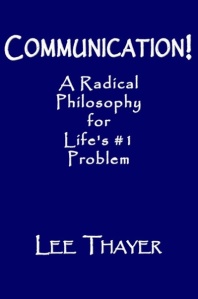Conventional Wisdoms: An Exercise (#2)
It was a great challenge to think through Lee Thayer’s thoughts on “advice” and knowledge in the previous post (Figuring Out). Today, I would like to tackle his second “Brain Exercise,” and attempt to think through it and make it meaningful to myself and hopefully to you, the reader. The second exercise calls for us to carefully think about the following:
“Conventional wisdoms always and inevitably produce conventional results. This means that if you perceive some problem or opportunity in a conventional way (just because that’s the way your mind works), you will come up with a conventional solution. But high performance, real achievement, is far from being the norm, far from being “conventional.” So the implication is that if you want to achieve extraordinary results, results that are not more or less “average,” then you have to produce those results out of some fairly unconventional wisdoms. … [Often such] perspectives … are counter-intuitive. That is, they run contrary to what most people already believe… always and inevitably …”
What unconventional way(s) could we think through this idea that would lead us to a better, more beneficial way of thinking? What Thayer seems to be saying is that the more conventional your thinking, the more conventional the results will be by virtue of your being limited by the conventional ideas which you use. That is, if you seek change in your organization, and since it comes from the thinkers you have available to you (your “resources”), you best make sure that the wisdoms you are drawing off of are potent enough to lead your thinking in the direction of that desired change. However, if the members of your organization are bounded by a “conventional” way of thinking, then that change itself will be “conventional.” We are limited by our thinking capacities.
Extraordinary (extra-ordinary) results come from one’s ability to think in ways that are not ordinary (conventional). The richer your mind, the richer the results of your thinking. If the stream of thinking in your or your competitor’s organization flows unchecked, then it will be that unchecked flow that will end up drowning your competitive edge. Thinking and questioning in counter-intuitive ways, having capable minds on hand will, on the other hand, provide critical power to your organization’s culture. Perhaps questioning conventionality and the conventions of your organization is the first step toward counter-intuitive problem solving?
In this light, it would seem that questions and the ability to be a superior questioner, in light of your purpose and your ideals (the ideals of your organization), would be a most beneficial skill to develop (is there a more “unconventional” approach that I am overlooking?). That, and perhaps, developing the ability to decipher the useful and provocative wisdoms from the run-of-the-mill ideas that get pushed by the mass business press.
Where would you look for the resources needed to become a skillful unconventional thinker? How does one begin to develop ab-normal strategies for high performance? What thinkers have colonized and influenced your (or your organization’s) mind? Where have they led you thus far? Can one be such a risk-taker in a conventionally-minded organization? What are the risks?



![Reblog this post [with Zemanta]](https://i0.wp.com/img.zemanta.com/reblog_a.png)
 I have studied (and worked hard at understanding) the works of Lee Thayer since 2000 and am eagerly awaiting his newest book on Communication,
I have studied (and worked hard at understanding) the works of Lee Thayer since 2000 and am eagerly awaiting his newest book on Communication, 
Reply